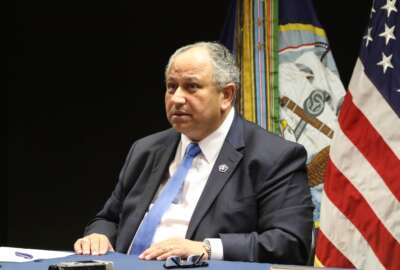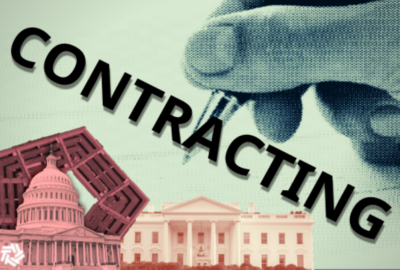When the door from government-to-industry leads to a brick wall
A high-level military official negotiates with a contractor, leaves the government, and joins the contractor. Is it a conflict of interest? Depends.
It is an old story, but new versions keep happening. A high-level military official negotiates with a contractor. He seeks employment, leaves the government, and joins the contractor. He may not have a conflict of interest, but if it looks like he does, that’s trouble. The Federal Drive with Tom Temin discusses this potential problem with Zach Prince, a procurement attorney with Haynes and Boone, LLP.
Interview Transcript:
Tom Temin Zach, tell us about the most recent decision resulted from protest, but a company was left out of a competition because of that appearance. What happened? Yeah.
Zach Prince So this is a procurement involving, dual band decoy system, which is intended to be, mitigation system for radar guided missiles that are targeting military aircraft and specifically the F-18. So right now, that you’ve got missiles that use two bands of radar to track aircraft, it’s very challenging to have effective countermeasures for them. So, the Navy is trying to develop and then implement a replacement for their current solution. So, they had two rounds of this and they’re going to have multiple iterations of the program. The first was a technical demonstration type portion that started a few years ago and followed on with an engineering, manufacturing and design phase and phase. Now, ultimately, it’ll go into, you know, low rate and full rate production. BAE and Raytheon were both recipients of the contract for the demonstration of the existing technologies. As part of this, at some point between that portion and the next portion, Raytheon started discussing employment with a Navy employee, longtime mathematician and technical expert with the Navy, with Navy Air, specifically who was running this program. And he left and joined Raytheon and then began representing Raytheon back to the government as a concern. This program had something to do with their response to the Navy’s request for information for the second round, some disputed amount of involvement for the submission of the proposal for the second round. And at some point the Navy realized, hey, this at least has a bad smell to it, and started doing a pretty thorough investigation.
Tom Temin Right? So, this fellow VK had participated in all of the work on the Navy’s behalf for the first phase of this long-term program, and while he was negotiating and dealing with Raytheon, he was also trying to get a job there, basically, and got the job. And now they’re into the dealing with the Navy for the follow on.
Zach Prince Yeah, to be fair, it wasn’t as egregious as I think. We all remember the tanker case from back in the early 2000 with the Air Force and Boeing. This guy VK was not actually negotiating for the government. He was doing some very technical work making recommendations on the technical implementation of the program. He wasn’t deciding solutions, but he did have access to proprietary information. And he had signed an NDA with the Navy expressly saying that he wouldn’t work for anybody who was part of this program.
Tom Temin Okay, so if it’s a very wide gray area, he was at one edge of it, let’s say, and a contracting officer decided to pull on that thread.
Zach Prince Yeah, he did. And somebody from the government raised the issue internally. The Navy did exactly what they’re supposed to do. They did a very thorough, extensive, monthslong investigation where they spoke to a number of people in the Navy. They gave Raytheon multiple opportunities to offer, comment and respond. And ultimately, they concluded that the appearance of impropriety here, they didn’t say there was necessarily impropriety, although it was really close, but at least the appearance was enough that they felt they had to exclude Raytheon from the competition.
Tom Temin And therefore I imagine Raytheon said, nope, we protest.
Zach Prince That’s right. I mean, it’s an important program. And the initial award, the MD phase, I think it was maybe $50 million. So, it’s not huge. But I think long term this is going to be multiple hundreds of millions of dollars not to get into full rate production or more. So, this is an important project for them. They protested to GAO and lost. Because the agency has a lot of discretion in these types of determinations. And then they filed that on to the court.
Tom Temin Right. And what happened at the court level?
Zach Prince They lost again, they had some pretty extensive briefing, some interesting arguments raised about why the mere appearance of impropriety without real hard facts that taint the procurement is not enough. But ultimately, their arguments tried to sideline some pretty clear Federal Circuit case law and the consistent decisions of the Court of Federal Claims, which really uphold the decisions of the contracting officer on this issue. In fact, Judge Sampson, who wrote this decision, said he did a survey of all the cases that have been decided by the court on this issue, at least since a federal Circuit decision that sort of set the precedent in the early 2000s. And not once has the court overturned the government’s decision on this.
Tom Temin Yeah. You wonder what the motivation of the company, or at least the judgment of the company was. I mean, you can see from an employee standpoint, the industry beckons with compensation packages, you know, in a cushy type of situation. But the company institutionally knows these shoals, especially long serving old line company like Raytheon. I mean, we can only speculate. So right now, then they’re out. Period. The end.
Zach Prince Yeah. That’s right. And my impression from reading these cases, I don’t think Raytheon really knew at all how much in-depth involvement this guy had with the program, and they knew that he was a fairly senior, very technically skilled individual from the Navy office that they have dealings with. And I think the level of expertise in electronic warfare countermeasures, particularly that this guy had, are really unique. So, Raytheon wanted to hire him on. He didn’t tell them that he had involvement with this program. And in fact, he called HR, the record shows like two days after he started with Raytheon and said that his involvement was very, very light in this program. He didn’t tell his ethics people that in the government, when he got his ethics letter, it was pretty clear that he was obfuscating his involvement because he did want to go to the private sector.
Tom Temin Right. So, one of the lessons is you don’t have to be part of the source selection board to get the government and your future employer into trouble.
Zach Prince Yeah. That’s right. If you’re a contractor, don’t let your contracting officer counterparts be blindsided by stuff like this if you possibly can. And maybe they couldn’t have. Here, make sure that you’re coming up with some mitigation strategy as early as you can. And Raytheon, as much as I just said, yeah, they probably didn’t know his full involvement. The record also shows it, BAE sent a letter to Raytheon not long after this guy started saying, hey, we know that you’ve got this guy. We think that there are some major issues with you having had this guy, because he had major exposure to our technical solutions and IP, you know, make sure to be following those government employment restrictions. They didn’t really.
Tom Temin Yeah. It’s almost what happened with the Defense Department more recently with the cloud contract, the Jedi contract that ultimately got sank. And one of the reasons involved there was that someone had worked in the government and ended up at the cloud company, or had been at the cloud company, then at the government, whatever. Not a source selection person necessarily, but an influencer, an adviser deep in there. And somebody ferreted that out and that ultimately helped sink that whole program, which they’ve now replaced with the joint warfare cloud capability. And that one is going and its multiple vendors. So, any other lessons that companies ought to take from this?
Zach Prince Yeah. It’s always such a challenging balancing act because on the one hand, as a company doing business with DoD, you want to have people who understand the inner workings of DoD. On the other hand, there are many situations were hiring just those types of people can create at least the appearance of conflicts, and that’s enough to taint the procurement. If the government is not convinced that there are mitigation mechanisms in place. So, you do want a firewall. People like this off from their former programs as much as possible, set up some ways in advance that you’ve documented for avoiding the appearance of impropriety, because otherwise you could end up in this type of situation precluded from doing work in a major program.
Tom Temin Yeah, sometimes the revolving door leads to a brick wall, you might say.
Zach Prince Good way to frame it.
Copyright © 2025 Federal News Network. All rights reserved. This website is not intended for users located within the European Economic Area.
Tom Temin is host of the Federal Drive and has been providing insight on federal technology and management issues for more than 30 years.
Follow @tteminWFED






